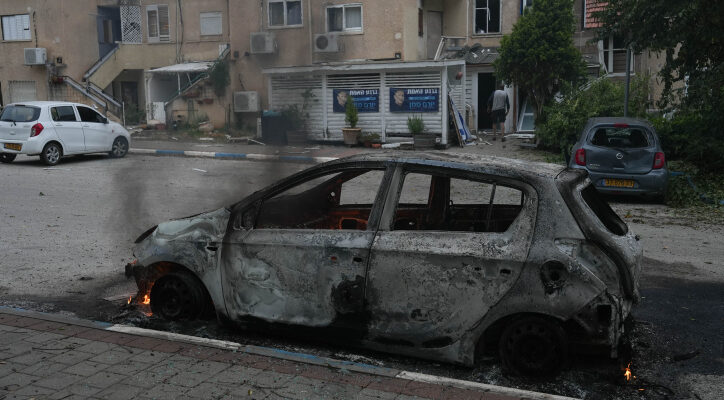Hezbollah has effectively turned part of northern Israel into its own security zone, a no-go zone for most of its residents, with heavily fortified Israel Defense Forces positions.
By Yaakov Lappin, JNS
Northern Israel is facing a dire security situation.
The 43 communities situated within three miles of the Lebanese border—home to some 61,000 citizens—remain evacuated, with no clear end in sight. Several thousand additional northern residents left their homes independently.
As the Alma Center recently noted in a report, many of these communities rely on tourism and agriculture, meaning that farmers are still arriving to work their land and tend to animals and herds.
Some of the communities’ industrial plants are still operational and employ workers from non-evacuated areas.
However, as reported by Ynet on May 18, in a sobering and unprecedented development, Hezbollah has effectively turned this part of northern Israel into its own security zone, a no-go zone for most of its residents, with heavily fortified Israel Defense Forces positions springing up in the Upper Galilee to guard it.
The situation is reminiscent of the buffer zone maintained in southern Lebanon for 15 years by Israel between 1985 to 2000—only on Israeli territory, not Lebanese.
This new line of fortifications, stretching a few kilometers from the border, includes numerous new outposts, as many evacuees wait for news of change.
It appears likely that the Israeli War Cabinet will need to choose from one of three main options soon, after the IDF completes its operation in Rafah and seizes the Philadelphi Corridor (unless Hezbollah escalates first, forcing Israel’s hand).
As former head of IDF Northern Command Maj. Gen. Gershon Hacohen stated on Monday, Israel has three primary options: Israel and Hezbollah both simply stop shooting, a faux negotiated agreement or a prolonged ground war.
The first option would involve both Israel and Hezbollah independently halting hostilities, without formal negotiations.
This approach could provide a temporary reduction in violence, offering a respite to civilians. However, the effectiveness and sustainability of such a ceasefire are uncertain.
Past experience shows that this type of “solution” ultimately leads to fresh hostilities, since it is impossible to placate or deter jihadist Iranian-backed terror armies.
In the context of the current conflict, a ceasefire could be particularly challenging to maintain given Hezbollah’s openly stated ideological commitment to destroying Israel.
As such, while the IDF could attempt to entice northern residents to return and offer them beefed up layers of protection, including large numbers of infantry and armored forces stationed at the border, this would be a hard sell, since Hezbollah isn’t going anywhere without an Israeli ground offensive.
As Lt. Col. (res.) Sarit Zehavi, founder and president of the Alma Center, noted during a conference on May 9, Hezbollah’s military and civilian infrastructures are deeply intertwined, creating a “resistance society” that continuously prepares for conflict.
Thus, any ceasefire would likely be fragile and temporary.
A negotiated agreement, brokered with the involvement of international actors such as the United States and France, would likely be no more stable.
This is because there is no force in southern Lebanon—not the Lebanese Armed Forces, itself infiltrated by Hezbollah, nor the toothless UNIFIL presence—that can enforce such an agreement.
They were unable to enforce U.N. Security Council Resolution 1701, in place since 2006, which banned Hezbollah activities south of the Litani River, and there is no reason to believe they would be any more successful now.
Hezbollah, for its part, demands territorial concessions as part of an “agreement,” particularly concerning the Shebaa Farms and Ghajar village, but these are mere pretexts.
UNSC Resolution 1559, passed in 2004, explicitly calls for the disarmament of all militias in Lebanon. Ultimately, these are all merely pieces of paper, with no connection to events on the ground in Lebanon.
During a meeting with local council heads on May 19, Israeli Prime Minister Benjamin Netanyahu spoke of the need for a robust and comprehensive plan to restore security to the northern region, while refusing to disclose specific strategies or timelines, according to Netanyahu to avoid giving Hezbollah any strategic advantage.
The third option is a war to destroy Hezbollah’s military capabilities—both its southern Lebanese bases and targeting parts of its massive arsenal, made up of some 250,000 warheads.
This approach is the only one that would fundamentally alter the security reality in the north—but would do so at the cost of major damage to the Israeli home front and significant military casualties.
While such a war would ultimately boost security for northern communities, Hacohen emphasized during an appearance at the Tov online television station that the ideological and strategic motivations driving Hezbollah will complicate any efforts to achieve a quick or decisive victory, and that even a successful war against Hezbollah will not pave a path to calm.
Moreover, it is important to account for the risk of a war with Hezbollah drawing in Iranian forces. This scenario would significantly strain Israel’s military resources.
Whichever path Israel’s War Cabinet chooses, northern Israel having become a no-go zone is a deeply dangerous precedent.
It represents ongoing harm to Israel’s sovereignty, which, if not corrected soon, will encourage the Iranian-led axis of jihad to expand the situation further south, risking Israel’s very existence.





